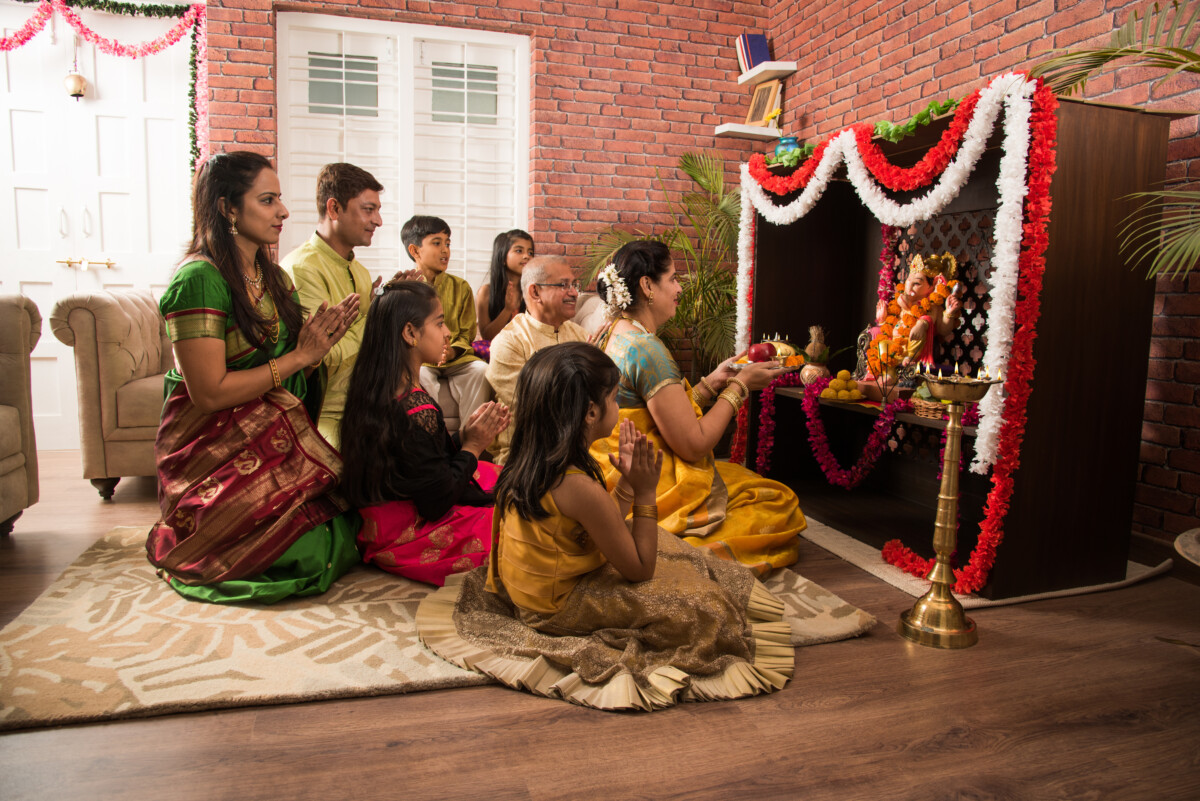Employee Resources
Hindu Americans throughout the country (and Hindus throughout the world) have so much variety in their religious beliefs and practices, but that variety does not undermine the importance of their religious traditions. Each household may celebrate a particular ceremony in accordance with the regional or specific Hindu Dharma tradition to which they belong. Different ceremonies may even carry different weight in each household, which may determine the amount of time and energy devoted to each ceremony. As with religious holidays, these religious ceremonies carry spiritual significance and can require the involvement of many family members, each with a specific role in the religious tradition.
Below, we discuss examples where religious accommodation should be requested and provide a template letter that can be used to request accommodation of religious ceremonies. You should edit the final letter to accurately reflect your needs and religious practices. We also have resources that provide an overview of religious accommodations and include detailed guidance on how to request them.


Example
A Hindu employee plans to be absent from work to attend mourning ceremonies for a close relative – this will include leaving early from work during the first 12 days after the death, and missing a full day of work on the 13th day after the death. The employee can request reasonable accommodation for each of these absences, and this can be accommodated in different ways depending on their work. For the first 12 days, if the employee needs to leave 2 hours early on each weekday, they can consider these options: using their available PTO each day, requesting the time off without pay, or even working a flexible schedule to make up the missed hours (by coming in 2 hours early or working hours on the weekend). The same options should be considered for the 13th day mourning ceremonies.
In addition to the religious accommodation request, the employee should look at any bereavement policies and use the time off available under those policies. Some states or cities may even offer medical leave, particularly if you experience the death of a loved one and suffer medical conditions affecting your ability to work. Each individual’s situation is different, so the options available will be different.
Important Note: Each workplace will have different policies on how employees are able to use time off (paid or unpaid), available leave(s), and flexible work. If you have paid time off or other paid leave, many employers require you to use that time off before providing unpaid time off or flexible work arrangements. Depending on your workplace or location, you may also have access to different types of leave (sick, parental, family, medical, bereavement, etc.). Make sure to review and understand those workplace policies before you discuss options with your manager or Human Resources department.
Sample Letter
Please make sure to fill out the form on the side so that the letter is automatically populated with your information.
Brief Descriptions of Common Hindu Ceremonies
Birth – Nāmakaraṇa, Annaprāśana, Muṇḍana
The birth of a child is an extremely significant event with accompanying religious obligations. In the Hindu tradition, this significant event requires different roles in religious ceremonies to be played by parents, siblings, grandparents, aunts or uncles, and even other extended family. Hindu ceremonies may be observed for many milestones related to the new life, such as: before the child is born, immediately after the child’s birth, naming the child, the first time the child has solid food, or the child’s first hair-cutting. A student may need to request accommodation so that they can attend these important religious ceremonies, particularly if they play a specific role in the ceremony.
Upanayana/Janeu
Similar to the Confirmation of Roman Catholics, or Bar-Mitzvahs in Judaism, the Upanayana is the religious ceremony for Hindu children (typically, around age 8-16) signifying that they are ready to commence study of their spiritual tradition and for the transition from the innocence of childhood to understanding their role in contributing to the betterment of society. Consistent with the family’s religious practices, this ceremony may take place at the family’s residence, mandir (Hindu temple), or in their ancestral village. Accordingly, a student may require religious accommodation for the time spent preparing for and performing these ceremonies, which entail diligent engagement of the child to impart the gravity and spiritual significance of this transition.
Marriage
As with births in Hindu households, the religious traditions surrounding Hindu marriages assign different roles in ceremonies to be played by parents, siblings, grandparents, aunts or uncles, and other extended family. Hindu marriages are considered to bind not only the newlyweds, but also their families, together. Religious ceremonies are required both before and after the main Hindu wedding ceremony. These ceremonies invoke different occasions related to the wedding process, such as commencing the wedding period, removing obstacles and inviting prosperity, remembrance of ancestors, the wedding ceremony itself, and post-wedding reception of the newlyweds to their married home. A student may need to request accommodation so that they can attend these important religious ceremonies, particularly if they play a specific role in the ceremony.
Funerals and Shrāddha
In Hindu traditions, the period immediately after the death of a loved one is set aside to mindfully focus on mourning, allowing the processing of grief by those connected to the dearly departed and encouraging the successful forward journey of the departed soul. Religious ceremonies during this time may include the funeral (often followed by cremation attended by close relatives) and nightly ceremonies through the 12th day after death, on the 13th day after death, on the 40th day after death, monthly until the first anniversary of the death, and annually on the anniversary of the death. In addition, during the annual fortnight of remembrance, households will dedicate one day to the memory of a close departed relative. Households will determine which ceremonies a child should attend on a case-by-case basis and according to their religious practices, whether that includes limited ceremonies or all of them, paying particular attention to assisting the child in grieving the loss of a close relative.
Tīrtha Yātrā
Similar to Hajj for Muslims, many Hindus practice commitments to undertake pilgrimages to holy sites. In the Hindu tradition, households that travel for pilgrimage to sacred sites or shrines will do so at designated times for the specific site. For example, the Ayyappan pilgrimage to Sabarimala in Kerala, India takes place in winter, and the pilgrimage to the sacred Himalayan peak of Mount Kailash takes place in summer. Pilgrimages are undertaken as a commitment for the entire household, and each family member would attend. Because these pilgrimages are undertaken as a household and timing may be determined by the site or extenuating circumstances (failing health of a family member, age-based requirements for the site, financial restraints, etc.) may require that a student be accommodated and allowed to observe the religious pilgrimage.
Purāṇa/Itihāsa Kathā
It is common for Hindu households to hold a religious gathering centered on sacred texts of the Hindu tradition. These religious beliefs and practices will vary widely among families as to which significant events will be celebrated with such a ceremony, which religious text is central, the days spanned, and which guests are invited to attend. In order to participate and observe these religious practices in their household, a student may require a religious accommodation.







































